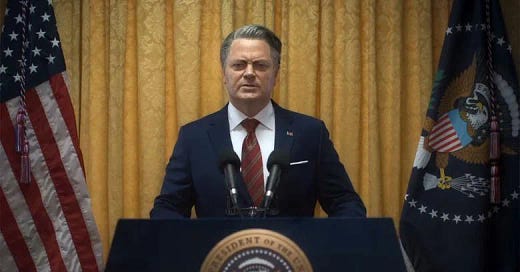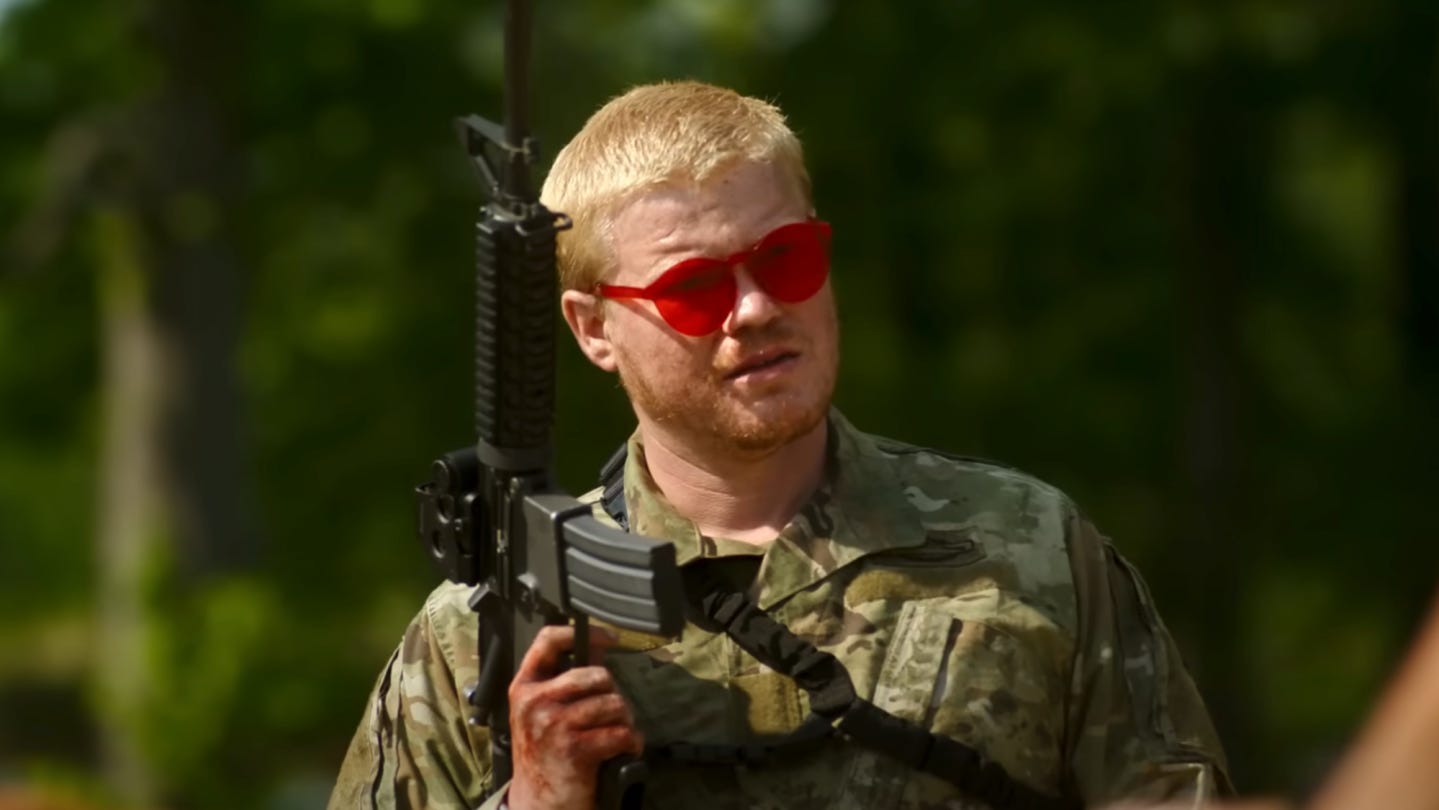*Vague spoilers ahead*
It’s interesting to read that Alex Garland was inspired to write and direct his latest movie Civil War to explore the idea of what a civil war in contemporary America could look like. Because it’s not really about a civil war at all.
There is one happening in the background, obviously. According to the bits you pick up in the movie, the near-future is: California and Texas, aligned as the Western Forces; Florida, seceded; and both of those states at war with the rest of the US, fighting under a Trumpish president. Don’t try and understand it – this movie uses that conflict as a setting, not a subject. It’s not interested in the hows, or whys. In fact it’s strenuously apolitical. Garland and some of the cast have made it clear in interviews that this was very deliberate, that they wanted to leave things vague so that audiences could “make up their own mind”. But when you try and put together the tidbits of information Civil War gives you, it’s basically incoherent, suggesting that the writer-director doesn’t even have a headcanon explanation. It reminds me of Joker — a movie closely linked to real-world danger, that in practice is actually anodyne.
I can understand wanting to sidestep the culture war bullshit that would have erupted had the movie been more explicit in the causes of its dystopia. But I still think it’s a missed opportunity. In a time of increasing political polarisation and overlapping crises of institutional legitimacy, how do you make a film called Civil War set in a recognisable near-future that doesn’t even speculate on how we got there from here? There are indeed allusions to real-world events – like the antifa violence at Black Lives Matter protests, or the January 6th “insurrection”. But through its vagueness, the movie demurs at the chance to say something about those events. It’s disappointing, but at the same, I don’t want to be too hard on a movie just because it’s not another movie I imagined in my head. So, how does Civil War fare on its own terms?
Well, while it’s not about a plausible intranational conflict, it’s not really about anything else either. We follow a group of war journalists heading to the front lines of the violence to try and grab an interview with the embattled President. Nothing about the film is inherent to its setting in a contemporary American Civil War – you could set this same story in any conflict or disaster zone. It’s actually a pretty classic framework, reminiscent of Apocalypse Now or even Garland’s previous Annihilation – a thrown-together team heads off on a dangerous quest into a mysterious land where the usual rules don’t apply, while simultaneously delving into the recesses of their own psyche.
Or that’s the idea, anyway. You’d think this setup would be an opportunity to explore ideas of violence, morality, grief, guilt, horror, love, whatever. But again, the film baulks at the edge of really saying anything. A conflict photographer begins a mentoring relationship with a protege who maybe reminds her of a younger, less cynical self… but it doesn’t develop much further than that. The desensitized journalist has to confront violence that shocks an emotional reaction out of him… but that too fizzles out. Given the characters we’re following are all journalists, you might expect some commentary on the ethical dilemmas in war reporting, or the terrible burden of watching atrocities as a bystander, or even an examination of the media’s power to stop or cause bloody violence. And while there are gestures at some of these ideas, there is no depth to it – you are left to fill the gaps in your head. It’s like each of our protagonists are only three-quarters complete as characters. They’re well drawn, and the cast does a good job bringing them to life. But there’s no satisfying arc, no growth, no journey. Maybe that would work in a much more cynical, brutal film, but again, this is pretty much a classic road trip movie in form.
The worst part of it all: while Civil War might not have anything to say – it says it so well.
The staging of the various combat and action sequences is genuinely brilliant. They feel gritty and real, with an intensity and tangible sense of danger. At the same time, these sequences are shot and edited with quiet clarity. Even in the chaos of building-to-building urban combat, you always understand what the goal is and where the danger lies.
But even the best shots, the most exciting scenes, the coolest moments, are undermined by the vacancy at the core of Civil War. By not committing to anything thematically, things just feel like they’re happening without purpose. Characters act out-of-character, but it doesn’t come from anywhere or lead to anything. In one scene our journalists are traumatised by war crimes, in the next they’re waltzing carefree through a firefight. The same army is alternately hostile and accommodating towards the journalists, depending what the scene requires. The no man’s land our protagonists are crossing is supposed to be extremely dangerous, but then they come across a town that is completely peaceful and undamaged (the reason given is “we just stay out of it” – damn, why didn’t every decimated town think of that?)
The ending is a microcosm of all the best and worst of Civil War. In an edge-of-your-seat sequence, we see an urban assault on Washington D.C. It’s cool as hell, but has the emotional valence of a round of Call of Duty. As if it’s aware that it needs some kind of grand climax, the final scenes include a surprise moment that should be shocking and moving – but because it kind of comes from nowhere, it feels cheap, an unearned grab for the emotions that doesn’t mean anything. As if it wasn’t explicit enough, the final few lines of Civil War beat you over the head: don’t look for anything here, it’s not that deep. It’s bizarre how intent this movie is on declining the chance to be meaningful. And if it’s supposedly being done for our sake, the viewer, to give us the chance to “make up our own minds”, the only response is: make up our own minds on what?





